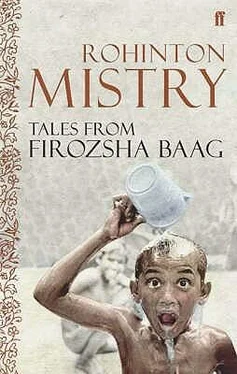Rohinton Mistry - Tales From Firozsha Baag
Здесь есть возможность читать онлайн «Rohinton Mistry - Tales From Firozsha Baag» весь текст электронной книги совершенно бесплатно (целиком полную версию без сокращений). В некоторых случаях можно слушать аудио, скачать через торрент в формате fb2 и присутствует краткое содержание. Год выпуска: 2006, Издательство: Faber & Faber, Жанр: Современная проза, на английском языке. Описание произведения, (предисловие) а так же отзывы посетителей доступны на портале библиотеки ЛибКат.
- Название:Tales From Firozsha Baag
- Автор:
- Издательство:Faber & Faber
- Жанр:
- Год:2006
- ISBN:нет данных
- Рейтинг книги:3 / 5. Голосов: 1
-
Избранное:Добавить в избранное
- Отзывы:
-
Ваша оценка:
- 60
- 1
- 2
- 3
- 4
- 5
Tales From Firozsha Baag: краткое содержание, описание и аннотация
Предлагаем к чтению аннотацию, описание, краткое содержание или предисловие (зависит от того, что написал сам автор книги «Tales From Firozsha Baag»). Если вы не нашли необходимую информацию о книге — напишите в комментариях, мы постараемся отыскать её.
Tales From Firozsha Baag — читать онлайн бесплатно полную книгу (весь текст) целиком
Ниже представлен текст книги, разбитый по страницам. Система сохранения места последней прочитанной страницы, позволяет с удобством читать онлайн бесплатно книгу «Tales From Firozsha Baag», без необходимости каждый раз заново искать на чём Вы остановились. Поставьте закладку, и сможете в любой момент перейти на страницу, на которой закончили чтение.
Интервал:
Закладка:
Jaakaylee, O Jaakaylee, she is calling from dining-room. They must want more curry. Good thing I took some out for my dinner, they will finish the whole pot. Whenever I make Goan curry, nothing is left over. At the end seth always takes a piece of bread and rubs it round and round in the pot, wiping every little bit. They always joke, Jaakaylee, no need today for washing pot, all cleaned out. Yes, it is one thing I really enjoy, cooking my Goan curry, stirring and stirring, taking the aroma as it boils and cooks, stirring it again and again, watching it bubbling and steaming, stirring and stirring till it is ready to eat .
Condolence Visit
Yesterday had been the tenth day, dusmoo, after the funeral of Minocher Mirza. Dusmoo prayers were prayed at the fire-temple, and the widow Mirza awaited with apprehension the visitors who would troop into the house over the next few weeks. They would come to offer their condolence, share her grief, poke and pry into her life and Minocher’s with a thousand questions. And to gratify them with answers she would have to relive the anguish of the most trying days of her life.
The more tactful ones would wait for the first month, maasiso , to elapse before besieging her with sympathy and comfort. But not the early birds; they would come flocking from today. It was open season, and Minocher Mirza had been well-known in the Parsi community of Bombay.
After a long and troubled illness, Minocher had suddenly eased into a condition resembling a state of convalescence. Minocher and Daulat had both understood that it was only a spurious convalescence, there would be no real recovery. All the same, they were thankful his days and nights passed in relative comfort. He was able to wait for death freed from the agony which had racked his body for the past several months.
And, as it so often happens in such cases, along with relief from physical torment, the doubts and fears which had tortured his mind released their hold as well. He was at peace with his being which was soon to be snuffed out.
Daulat, too, felt at peace because her one fervent prayer was being answered. Minocher would be allowed to die with dignity, without being reduced to something less than human; she would not have to witness any more of his suffering.
Thus Minocher had passed away in his sleep after six days spent in an inexplicable state of grace and tranquillity. Daulat had cried for the briefest period; she felt it would be sinful to show anything but gladness when he had been so fortunate in his final days.
Now, however, the inescapable condolence visits would make her regurgitate months of endless pain, nights spent sleeplessly, while she listened for his breath, his sighs, his groans, his vocalization of the agony within. For bearers of condolences and sympathies she would have to answer questions about the illness, about doctors and hospitals, about nurses and medicines, about X-rays and blood reports. She would be requested (tenderly but tenaciously, as though it was their rightful entitlement) to recreate the hell her beloved Minocher had suffered, instead of being allowed to hold on to the memory of those final blessed six days. The worst of it would be the repetition of details for different visitors at different hours on different days, until that intensely emotional time she had been through with Minocher would be reduced to a dry and dull lesson learned from a textbook which she would parrot like a schoolgirl.
Last year, Daulat’s nephew Sarosh, the Canadian immigrant who now answered to the name of Sid, had arrived from Toronto for a visit, after ten years. Why he had never gone back he would not say, nor did he come to see her any more. After all that she and Minocher had done for him. But he did bring her a portable cassette tape recorder from Canada, remembering her fondness for music, so she could tape her favourite songs from All India Radio’s two Western music programs: “Merry Go Round” and “Saturday Date.” Daulat, however, had refused it, saying “Poor Minocher sick in bed, and I listen to music? Never.” She would not change her mind despite Sarosh-Sid’s recounting of the problems he had had getting it through Bombay customs.
Now she wished she had accepted the gift. It could be handy, she thought with bitterness, to tape the details, to squeeze all of her and Minocher’s suffering inside the plastic case, and proffer it to the visitors who came propelled by custom and convention. When they held out their right hands in the condolence-handshake position (fingertips of left hand tragically supporting right elbow, as though the right arm, overcome with grief, could not make it on its own) she could thrust towards them the cassette and recorder: “You have come to ask about my life, my suffering, my sorrow? Here, take and listen. Listen on the machine, everything is on tape. How my Minocher fell sick, where it started to pain, how much it hurt, what doctor said, what specialist said, what happened in hospital. This R button? Is for Rewind. Some part you like, you can hear it again, hear it ten times if you want: how nurse gave wrong medicine but my Minocher, sharp even in sickness, noticed different colour of pills and told her to check; how wardboy always handled the bedpan savagely, shoving it underneath as if doing sick people a big favour; how Minocher was afraid when time came for sponge bath, they were so careless and rough — felt like number three sandpaper on his bedsores, my brave Minocher would joke. What? The FF button? Means Fast Forward. If some part bores you, just press FF and tape will turn to something else: like how in hospital Minocher’s bedsores were so terrible it would bring tears to my eyes to look, all filled with pus and a bad smell on him always, even after sponge bath, so I begged of doctor to let me take him home; how at home I changed dressings four times a day using sulfa ointment, and in two weeks bedsores were almost gone; how, as time went by and he got worse, his friends stopped coming when he needed them most, friends like you, now listening to this tape. Huh? This letter P? Stands for Pause. Press it if you want to shut off machine, if you cannot bear to hear more of your friend Minocher’s suffering…”
Daulat stopped herself. Ah, the bitter thoughts of a tired old woman. But of what use? It was better not to think of these visits which were as inevitable as Minocher’s death. The only way out was to lock up the flat and leave Firozsha Baag, live elsewhere for the next few weeks. Perhaps at a boarding-house in Udwada, town of the most sacrosanct of all fire-temples. But though her choice of location would be irreproachable, the timing of her trip would generate the most virulent gossip and criticism the community was capable of, to weather which she possessed neither the strength nor the audacity. The visits would have to be suffered, just as Minocher had suffered his sickness, with forbearance.
The doorbell startled Daulat. This early in the morning could not bring a condolence visitor. The clock was about to strike nine as she went to the door.
Her neighbour Najamai glided in, as fluidly as the smell of slightly rancid fat that always trailed her. The pounds shed by her bulk in recent years constantly amazed Daulat. Today the smell was supplemented by dhansaak masala , she realized, as the odours found and penetrated her nostrils. It was usually possible to tell what Najamai had been cooking, she carried a bit of her kitchen with her wherever she went.
Although about the same age as Daulat, widowhood had descended much earlier upon Najamai, turning her into an authority on the subject of Religious Rituals And The Widowed Woman. This had never bothered Daulat before. But the death of Minocher offered Najamai unlimited scope, and she had made the best of it, besetting and bombarding Daulat with advice on topics ranging from items she should pack in her valise for the four-day Towers Of Silence vigil, to the recommended diet during the first ten days of mourning. Her counselling service had to close, however, with completion of the death rituals. Then Daulat was again able to regard her in the old way, with a mixture of tolerance and mild dislike.
Читать дальшеИнтервал:
Закладка:
Похожие книги на «Tales From Firozsha Baag»
Представляем Вашему вниманию похожие книги на «Tales From Firozsha Baag» списком для выбора. Мы отобрали схожую по названию и смыслу литературу в надежде предоставить читателям больше вариантов отыскать новые, интересные, ещё непрочитанные произведения.
Обсуждение, отзывы о книге «Tales From Firozsha Baag» и просто собственные мнения читателей. Оставьте ваши комментарии, напишите, что Вы думаете о произведении, его смысле или главных героях. Укажите что конкретно понравилось, а что нет, и почему Вы так считаете.












